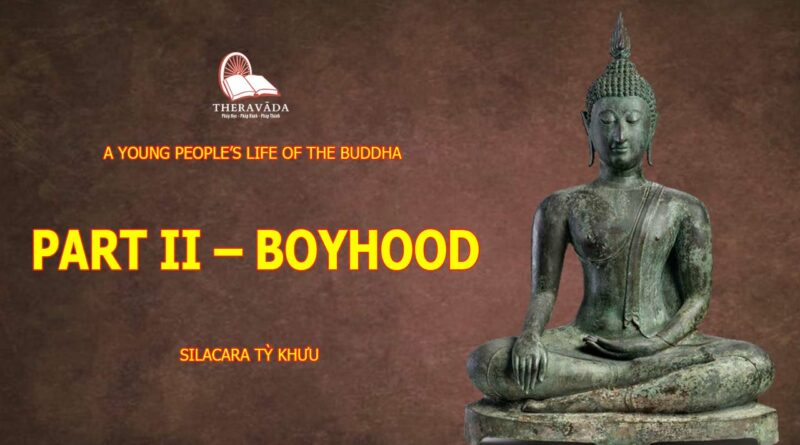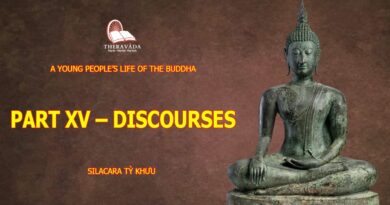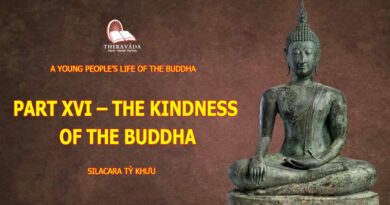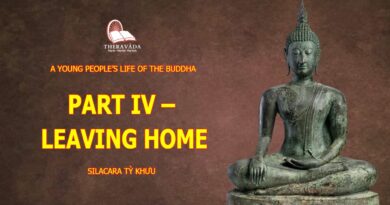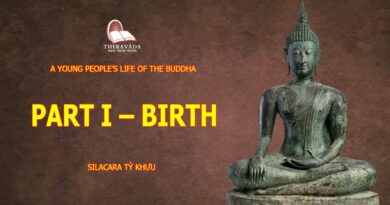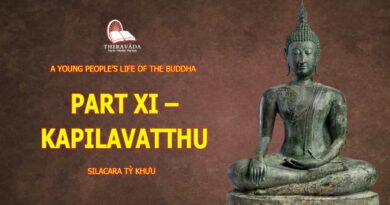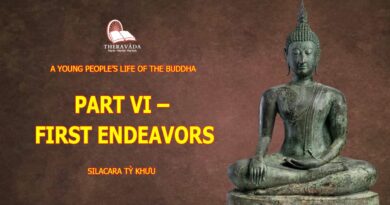A YOUNG PEOPLE’S LIFE OF THE BUDDHA: PART II – BOYHOOD
The old hermit and the wise men who gathered together on Siddhattha’s name-giving day had agreed in saying that King Suddhodana’s son was no ordinary boy, and their words were very soon proved true. After being brought up under the kind care of his aunt Mahapajapati who nursed and attended to her dead sister’s child as if he had been her own, until he reached the age of eight years, teachers then were got for the young prince in order that he might learn reading and writing and arithmetic. Under these teachers’ instructions he quickly learned all each had to teach in his own subject. Indeed, he learned so quickly and well that every one was astonished, his teachers and his father and foster-mother as well, at the rapid progress he made. For no matter what subject he was being taught, as soon as he was told anything, at once his mind took hold of what he was told and he never again forgot it, in this way showing himself particularly apt at arithmetic. Thus it was easily seen by all that as regarded the power of his mind he was well endowed, indeed, very much beyond the common. Yet with all his so superior ability in learning, and the high position he held in the country as the heir to the throne, he never failed to show to his teachers that respect which a pupil always should show, seeing that it is through them they gain. The prince was always gentle and dignified in his usual bearing towards every one about him, and towards his teachers in particular, ever modest and deferent and respectful.
In bodily attainments also, he was no less well endowed than he was in mind and character. Notwithstanding the gentleness of his manners, notwithstanding that he was a gentle man in the very best sense of the words, he was bold and fearless in the practice of all the manly sports of his country. He was a cool and daring horseman and an able and skillful chariot-driver in this latter sport winning many chariot races against the best drivers in the country. Yet for all his keenness in trying to win a race, he was kind and compassionate towards the horses who helped him to win so often, and frequently would let a race be lost rather than urge his weary, panting horses beyond their strength. And not only towards his horses but towards all creatures he seemed to have a heart full of tenderness and compassion. He was a king’s son and had never himself had to suffer hardship or distress, yet in his kind heart he seemed to know by sympathy how others felt when they were afflicted or in pain, whether these others were men or animals; and when he was quite to others as far as he could {sic}, and where it was possible, tried to relieve any suffering they already were enduring.
Thus, once when he was out walking in the country with his cousin Devadatta who had his bow and arrows with him, Devadatta shot a swan that was flying over their head. His arrow hit the swan and it fluttered down, painfully wounded, to the ground. Both boys ran forward to pick it up, but Siddhattha reached it first and holding it gently, he pulled the arrow out of its wing, put some cool leaves on the wound to stop it from bleeding, and with his soft hand stroked and soothed the hurt and frightened bird. But Devadatta was very much annoyed to see his cousin take the swan from him in this way, and he called to Siddhattha to give the swan to him because he had brought it down with his arrow. Siddhattha, however, refused to give it to him, saying that if the bird had been killed, then it would have been his; but as it was alive and not dead, it belonged to the one who actually secured possession of it, and so he meant to keep it. But still Devadatta maintained that it should belong to him because it was his arrow that had brought it down to the ground.
So Siddhattha proposed and Devadatta agreed that their dispute should be sent for settlement to a full council of the wise men of the country. The council, accordingly, was called and the question put before them; and some in the council argued one way and some the other; some said the bird should be Devadatta’s, and others said that Siddhattha was quite right to keep it. But at last one man in the council whom nobody had ever seen before rose and said: “A life certainly must belong to him who tries to save it; a life cannot belong to one who is only trying to destroy it. The wounded bird by right belongs to the one who saved its life. Let the swan be given to Siddhattha.” All the others in the council agreed with these wise words, and Prince Siddhattha was allowed to keep the swan whose life he thus had saved. And he cared for it tenderly until it was quite cured of its wound; then he set it free and let it fly back once more well and happy to its mates on the forest-lake.
Source: Budsas.net

